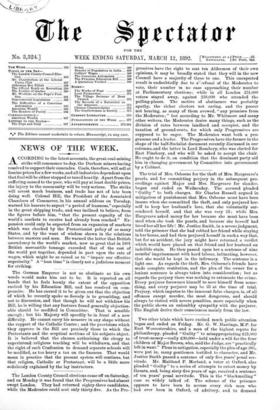NEWS OF THE WEEK
ACCORDING to the latest accounts, the great coal-mining strike will commence to-day, the Durham miners having resolved to support their comrades. Coals, therefore, will sell at famine prices for a few weeks, and all industries dependent upon that fuel will be either stopped or taxed heavily. Apart from the suffering caused to the poor, who will pay at least double prices, the injury to the community will be very serious. The strike will arrest much business, and trade has not of late been doing well. Colonel Hill, the President of the Associated Chambers of Commerce, in his annual address on Tuesday, warned his hearers to expect "a period of leanness," especially in the great shipping trade, and was inclined to believe, from the figures before him, "that the present capacity of the world's markets to receive had already been reached." Ex- pansion could only be expected from an expansion of markets which was checked by the Protectionist policy of so many States, and by the want of wisdom shown in the relations between masters and men. He warned the latter that British ascendency in the world's market, now so great that in 1891 British mercantile tonnage exceeded that of the rest of the world put together, depended in part upon the rate of wages, which might be so raised as to "impair our effective superiority." A "lean time" is clearly not a judicious moment for striking.
The German Emperor is not so obstinate as his own words would make him out to be. It is reported on all hands that he feels keenly the extent of the opposition excited by his Education Bill, and has resolved on com- promise. He has caused it to be given out that the objection of which he recently spoke so fiercely is to grumbling, and not to discussion, and that though he will not withdraw his Bill, he is willing that any features found generally objection- able should be modified in Committee. That is sensible enough ; but his Majesty will speedily be in front of a new difficulty. He cannot carry his measure in any shape without the support of the Catholic Centre ; and the provisions which they approve in the Bill are precisely those to which the Protestants and the sceptical sections of his subjects object. It is believed that the clauses authorising the clergy to superintend- religions teaching will be withdrawn, and that the right of each Confession to demand separate schools will be modified, as too heavy a tax on the finances. That would mean in practice that the present system will continue, but that religion, Catholic or Protestant, will be a little more sedulously explained by the lay instructors.


































